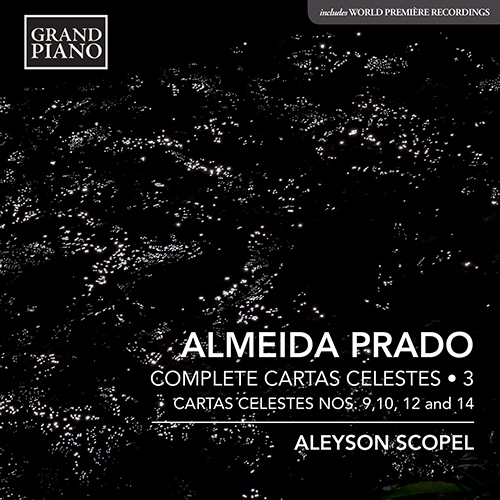
About this Release
“As the Cartas Celestes progress, so does Almeida Prado's sound world and colour palette, reaching a highly transcendent and poetic view of the universe whilst integrating a new harmonic language. Perhaps more so than the initial six volumes, which formed a long arched unit, these works stand alone as individual pieces. They draw inspiration not only from the sky, but also from mythological and philosophical references, building up a fantastic continuation to the cycle. Recording them makes me understand the stylistic changes the composer underwent in the most profound way.” — Aleyson Scopel
ALMEIDA PRADO, JOSÉ ANTÔNIO REZENDE DE (1943–2010)
Complete Cartas Celestes • 3
Nos. 9–10, 12 and 14
- Aleyson Scopel, piano
Almeida Prado’s vast cycle of Cartas Celestes (Celestial Charts) depicts the celestial bodies visible in the Brazilian night sky during the four seasons of the year. As the cycle evolves so does Almeida Prado’s sound world and colour palette, reaching a highly transcendent and poetic view of the universe with an ever-evolving harmonic language that includes the composer’s own invented “transtonality”. The composer himself described Aleyson Scopel’s performances on Volume 1 [GP709] as “straight from heaven!”
This recording was made on a modern instrument: Hamburg Steinway & Sons Concert Grand Model D
Tracklist
|
1
Cartas Celestes No. 9 (1999) * (00:17:07)
|
|
2
Cartas Celestes No. 10, "The Constellations of the Mystical Animals" (2000) * (00:15:55)
|
|
3
Cartas Celestes No. 12, "The Sky of Nicholas Roerich" (2000) * (00:12:51)
|
|
4
Cartas Celestes No. 14 (2001) (00:15:31)
|
The Artist(s)
 Brazilian pianist Aleyson Scopel has performed worldwide in solo, chamber and concerto settings. A recipient of the Nelson Freire and Magda Tagliaferro awards, he has also won numerous prizes in international competitions such as the William Kapell, Villa-Lobos, Corpus Christi, Kingsville and Southern Highland International Piano Competitions. His performance of the first set of Cartas Celestes by Almeida Prado was thus received by the composer: ’It came straight from heaven! Meteor Showers, radiant constellations, glowing nebulae and a transcendental vitality marked the genial interpretation of this colossal pianist.’ Prado would later dedicate to Scopel the 15th set of the series. Aleyson Scopel graduated with distinction in performance and academic honours from the New England Conservatory of Music, in Boston.
Brazilian pianist Aleyson Scopel has performed worldwide in solo, chamber and concerto settings. A recipient of the Nelson Freire and Magda Tagliaferro awards, he has also won numerous prizes in international competitions such as the William Kapell, Villa-Lobos, Corpus Christi, Kingsville and Southern Highland International Piano Competitions. His performance of the first set of Cartas Celestes by Almeida Prado was thus received by the composer: ’It came straight from heaven! Meteor Showers, radiant constellations, glowing nebulae and a transcendental vitality marked the genial interpretation of this colossal pianist.’ Prado would later dedicate to Scopel the 15th set of the series. Aleyson Scopel graduated with distinction in performance and academic honours from the New England Conservatory of Music, in Boston. The Composer(s)
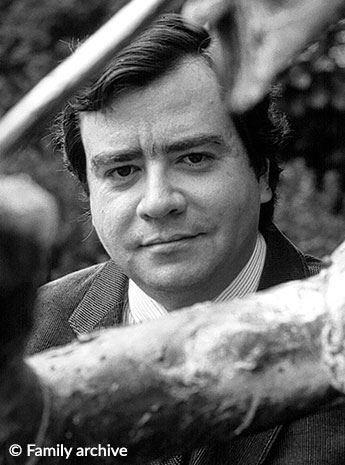 One of the most prolific composers to emerge from Brazil, José Antônio Rezende de Almeida Prado began as a cultivator of nationalism, studying with Camargo Guarnieri, but as a pupil of Boulanger and Messiaen in Paris was compelled to look for other means of self-expression, attaining a level of aesthetic freedom which encompassed atonalism, post-serialism, extended and free tonalism. Among his most important achievements, referred to by him as an “incredible adventure”, are his 18 Cartas Celestes (Celestial Charts), a set of works depicting the sky and constellations, in which he adopted a new harmonic language called “transtonality”. Of the 18 Cartas Celestes, 15 are written for solo piano, while the remaining three are scored two pianos and symphonic band (No. 7), for violin and orchestra (No. 8) and for piano, marimba and vibraphone (No. 11).
One of the most prolific composers to emerge from Brazil, José Antônio Rezende de Almeida Prado began as a cultivator of nationalism, studying with Camargo Guarnieri, but as a pupil of Boulanger and Messiaen in Paris was compelled to look for other means of self-expression, attaining a level of aesthetic freedom which encompassed atonalism, post-serialism, extended and free tonalism. Among his most important achievements, referred to by him as an “incredible adventure”, are his 18 Cartas Celestes (Celestial Charts), a set of works depicting the sky and constellations, in which he adopted a new harmonic language called “transtonality”. Of the 18 Cartas Celestes, 15 are written for solo piano, while the remaining three are scored two pianos and symphonic band (No. 7), for violin and orchestra (No. 8) and for piano, marimba and vibraphone (No. 11). 
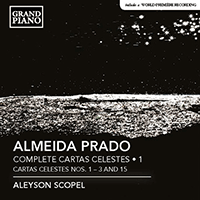
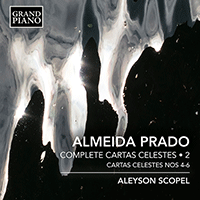
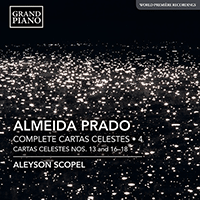
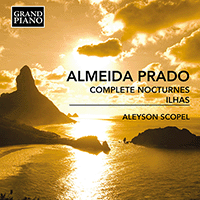
 Grand Piano has gained a reputation for producing high quality recordings of rare keyboard gems. Dedicated to the exploration of undiscovered piano repertoire, the label specialises in complete cycles of piano works by many lesser-known composers, whose output might otherwise have remained unknown and unrecorded.
Grand Piano has gained a reputation for producing high quality recordings of rare keyboard gems. Dedicated to the exploration of undiscovered piano repertoire, the label specialises in complete cycles of piano works by many lesser-known composers, whose output might otherwise have remained unknown and unrecorded.






